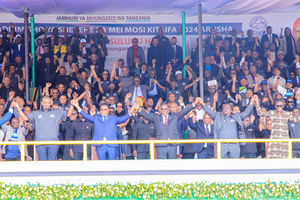Numerous taxes overwhelm airlines

Works,Transport and Communication Minister Makame Mbarawa speaks at a past event. PHOTO|FILE
What you need to know:
Such charges, according to operators, are those for landing, parking, passenger services, departure and navigation.
Others are insurance and an 18-per cent value-added tax (VAT) on leasing of aircraft and spare parts, fuel and experts training.
Dar es Salaam. Airlines have called on the government to reduce the number of charges to lessen operational costs.
Such charges, according to operators, are those for landing, parking, passenger services, departure and navigation.
Others are insurance and an 18-per cent value-added tax (VAT) on leasing of aircraft and spare parts, fuel and experts training.
“High operational costs eat into profits,” ATCL managing director Ladislaus Matindi told BusinessWeek.
A lot of money is spent on fuel, salaries, ownership costs, government fees and taxes, maintenance and insurance.
“The biggest thing that eats into the profit is fuel.”
Fuel costs accounts for up to 40 per cent of the operational costs, according to stakeholders.
They add that the fuel price is 20 per cent higher in Africa than in Europe.
Mr Matindi said high insurance premiums and costs of personnel exacerbate the situation.
Insurance costs account for 7-10 per cent of costs, according to operators. Players have been paying high insurance premiums because the sector in the country is considered accident-prone. To improve the situation, the Tanzania Civil Aviation Authority (TCAA) is planning to buy four modern radars. Two of them will be bought in this financial year and Sh8.8 billion has been set aside for the project. Coming to departure taxes for international and domestic travellers are $49 (about Sh107, 800) and Sh13, 000 respectively, according to experts. Mr Matinde said training an aviator is costly. $30,000 (Sh66 million) is needed for a three-year course.
With 14 aviators, ATCL is short of 10 pilots to make it reach a break-even point in the next three years.
The Tanzania Airport Authority (TAA) says passenger service charge stands at Sh10,000 and $40 for domestic and international flights respectively.
Parking charges for aircraft of up to 20,000kg stand at Sh1, 000 per 12 hours and $5 (Sh11, 000) for airliners registered in Tanzania and foreign ones, respectively. Charges for aircraft ranging from 20,000kg and 60,000kg stand at Sh1,000 for six hours and $5 (Sh11, 000) for local and foreign airliners respectively.
The landing charge per 1,000kg at Dar es Salaam, Kilimanjaro, Zanzibar and Pemba airports are $5 (Sh11,000).
Aviation experts are worried that high operational costs will undermine the sector’s growth.
Precision Air Company chief executive officer Sauda Rajab calls on the government to create a conducive operating environment. “Multiple charges hamper the growth of air transport. Good policies can lower airport taxes and other charges.” She proposes that VAT on leasing aircraft be removed.
“The industry is facing a crisis. Unless challenges are dealt with the number of travelers will drastically fall. The government should intervene to avert the situation,” warned an expert.
TCAA public information officer Bestina Magutu has defended the arrangement of charging air operators, saying the rates are reasonable and were agreed upon by all stakeholders.
“The charges were approved at a stakeholders meeting. The airlines are complaining because they want to make profits,” she said.
Carriers in Africa are expected to perform badly with a net loss of $800 million (broadly unchanged from 2016), according to the International Air Transport Association (Iata).
Iata report shows that the region’s weak performance is being driven by regional conflict and the impact of low commodity prices.
However, the association announced that it expects the global airline industry to make a net profit in 2017 of $29.8 billion.
Aviation consultant Jimray Nangawe has advised operators to acquire light and fuel-efficient aircraft to reduce operational costs.




